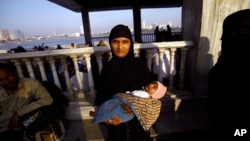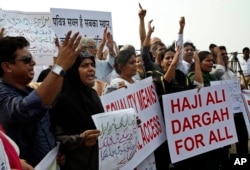In a key victory for women activists fighting for equal access to places of worship in India, the Mumbai High Court Friday lifted a ban on women entering the inner sanctum of one of the country’s most prominent mosques, the Haji Ali Dargah.
Women’s rights campaigners, who are leading a nationwide campaign called “Right to Pray,” hailed the judgment as a major milestone in their agenda not just to end discriminatory practices in places of worship, but the notion that women are not equal to men.
A two-judge bench ruled that the restriction imposed on women in the 15th century Haji Ali Dargah mosque is contrary to the fundamental rights of a person as provided in the constitution and asked the state government to ensure safety for women devotees.
6-week waiting period
However, women will have to wait before they can set foot in the mosque’s inner sanctum. The high court has put a stay on its order for six weeks to give time to the mosque’s trustees to appeal to the Supreme Court.
Calling the verdict a big victory, one of the petitioners, Zakia Soman, said the time for change has come. “The difference now is that there are several determined women who are willing to fight for justice and for equality,” she said. Soman is the co-founder of a Muslim women’s rights group (Bharatiya Muslim Mahila Andolan).
Built on an inlet, the Haji Ali mosque was constructed on the spot where legend says the body of a Sufi saint, Pir Haji Ali Shah Bukhari, washed up on rocks in the Arabian Sea. The Mumbai landmark is visited by tens of thousands of visitors every week.
Reason for ban
Although women had been allowed in the inner sanctum where his tomb lay for hundreds of years, trustees imposed the ban four years ago citing religious tradition. They argued in court that allowing women inside the dargah of a male saint was a “grievous sin.”
The judgment comes five months after women campaigners gained entry against opposition by Hindu priests to the inner sanctum of a prominent temple, Shani Shingnapur, in Ahmednagar district in Maharashtra state.
Trupti Desai, an activist who has been at the forefront of the “Right to Pray Campaign,” said their struggle has nothing to do with religion. “We are not challenging tradition, we are challenging traditions that are wrong.”
The campaign to enter the Haji Ali mosque is part of a larger reform agenda mounted by Muslim women activists in India.
Next battle: 'triple talaq'
The petitioners say they will wage their next battle for a ban on the practice of “triple talaq” that allows a Muslim man in India to divorce his wife by uttering the words “talaq” three times. Called “instant” or “oral” divorce, Muslim women say the arbitrary practice allows no room for a woman’s voice to be heard. The Supreme Court is currently hearing a case challenging the practice.
In an earlier interview with VOA, Zakia Soman said gender discrimination had nothing to do with Quranic traditions. “Owing to the hegemony of patriarchal forces, the situation has come to be the way we are seeing today.”






